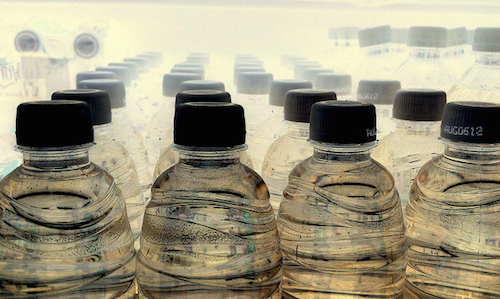Update: April 13, 2015. California investigating Nestle water permit, which expired in 1988!
I grew up believing I was entitled to free, clean water—no exceptions.
Later, when I lived in Paris, I became incensed at bartender’s refusal to give me tap water. They wanted me to buy water?
Outrageous.
In the United States, establishments that sell alcohol are legally bound to procure drinking water upon request. Refusing to give water to a thirsty patron is, quite literally, illegal.
Droughts aside, we in the United States enjoy a superabundance of potable water. Perhaps because it is available in such volume, perhaps because we are accustomed to privilege, we tend to take it for granted: we use perfectly clean, pure water to nourish our plants, manufacture appliances and even flush our toilets. (Though indeed some initiative has been taken to use recycled or reclaimed water for these purposes, the norm has not changed. Household toilets use one to seven gallons of water per flush)!
Now that is outrageous.
The UN declared water a basic human right in 2010. Since 2002, the world (as represented by the UN), has agreed that, “The human right to water is indispensable for leading a life in human dignity.” Unfortunately, like many universal rights declared by the UN, it has hardly proved universal.
Currently based in coastal Kenya, I am lucky to have my daily water needs filled by the lodge where I live and work. If I needed to, though, I could cover the cost of the 20 liter jugs of water—around 400ksh (4 USD) at the supermarket. Whether or not my water is free, I will always have the means to supply it and “lead a life in human dignity.”
I am lucky.
Free water is not a right; it is a delusion that a trip outside the “West” will quickly shatter.
I know this, and yet at the start of my time in Kenya, I experienced the familiar outrage when bars flatly refused to give me filtered water and insisted I buy bottled water marked up 400%. I cannot shake the belief—evidently deeply engrained—that water should be safe, fresh and freely available. A part of me still, irrationally, gets angry when I am expected to buy water in a restaurant or café.
It’s all trivial compared to the miles many women have to walk each day to retrieve water, the illnesses caused by lack of access to safe water—one of the leading causes of death worldwide—and the extreme levels of water conservation to which those without financial means are bound in most of the world.
Of course, water should be free and universally available, but it’s not.
Living in places with limited resources has repeatedly made me more aware of the extraordinary luxury I enjoy in the U.S.
Water awareness efforts exist—I remember grade school presentations on turning off the tap while brushing teeth and other small, but not insignificant measures everyone can take—but somehow it doesn’t sink in.
Even with the reality of water scarcity at our Californian doorstep, we seem to be lost in a haze of entitled delusion. Water should be free and clean and widely available, we think, only parroting what experience has taught us to be true
How could it be any other way?
The geopolitical conflict-ridden, dire global reality of water no longer hovers at a safe distance. When are we going to let go of our fantasy of abundance and see it?
refrences:
~
Relephant Read:
California to Run Out of Water in One Year.
~
Author: Toby Israel
Editor: Asheigh Hitchcock
Photo: Flickr



Read 1 comment and reply